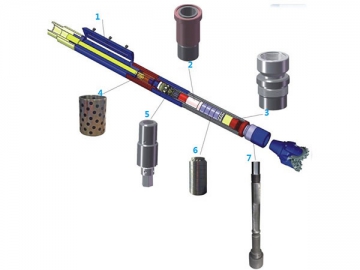Horizontal Directional Drill Rod and Bits
HDD transition rod is consisted of the 1st mandrel, mandrel housing, the 2nd mandrel, transmission housing, transmission structure and drill bits. It employs a movable bent structure to replace motor, reducing the mud consumption and improving the torque of transition rod.
The sonde housing behind the drill bit is connected with the outer drill pipe, and mounted at 1.75° angle with the main axis of drill rod. The double-drive drill bit is connected with dual-wall drill rod and delivers mud through the holes of the internal pipe's inner cavity.
1. Housing for sonde
2. TC bearings
3. TC bearings
4. Conversion joint
5. Universal joint
6. Cylindrical roller bearings
7. Transmission shaft
The drill bit of HDD transition rod is powered directly by inner drill rod, which works as a mechanical motor. With the host power being the same, the mechanical transmission efficiency is 30%-50% higher than the hydraulic efficiency of mud motor. So in rock construction, it is unnecessary to prepare a large amount of mud for the mud motor, and the cost for auxiliary materials is accordingly saved.
Dual-wall drill rod works at a high precision, avoiding the error caused from the large space between drill bit and sonde. It is especially applicable in sewage pipeline with extremely large directional control accuracy needs, as well as other heavy-duty pipeline construction.
Comparing with traditional drill rod, HDD lead rod is more suitable for various complex hard geological conditions.
| Model | KT-Z073 | KT-Z076 | KT-Z083 | KT-Z089 | KT-Z114 | |
| Pore size | mm | 95~121 | 95~121 | 114~149 | 114~149 | 149~200 |
| in | 3 3/4~4 3/4 | 3 3/4~4 3/4 | 4 5/8~5 7/8 | 4 5/8~5 7/8 | 5 7/8~7 7/8 | |
| Tubing joint | upper part | 2 3/8 REG | 2 3/8 REG | 3 1/2 REG | 3 1/2 REG | 3 1/2 REG |
| lower part | NC26 | NC26 | D80 | NC31 | NC46 | |
| Speed of drill bit(reference) | r/min | 195-340 | 195-340 | 195-320 | 195-320 | 150-260 |
| Torque (reference) | N.m | 650 | 650 | 970 | 970 | 2000 |
HDD drilling is a construction technique to build, repair and replace underground pipeline without excavation utilizing pipeline detection technique. It uses drill rig to produce holes and receives the signal sent by drill bit to realize an effective control upon the movement path of holes. Its working process can be divided into 3 steps: hole drilling, hole expanding, and dragging pipeline back.
a. Horizontal drilling in various complex geological conditions
b. Drill tools with different specifications for pipeline with different weight and diameter
c. Drill tools with different specifications for drill rigs of different push force and dragging force
d. For different specifications of drill rigs and drill tools
e. Various rod specifications are available for different geological conditions
